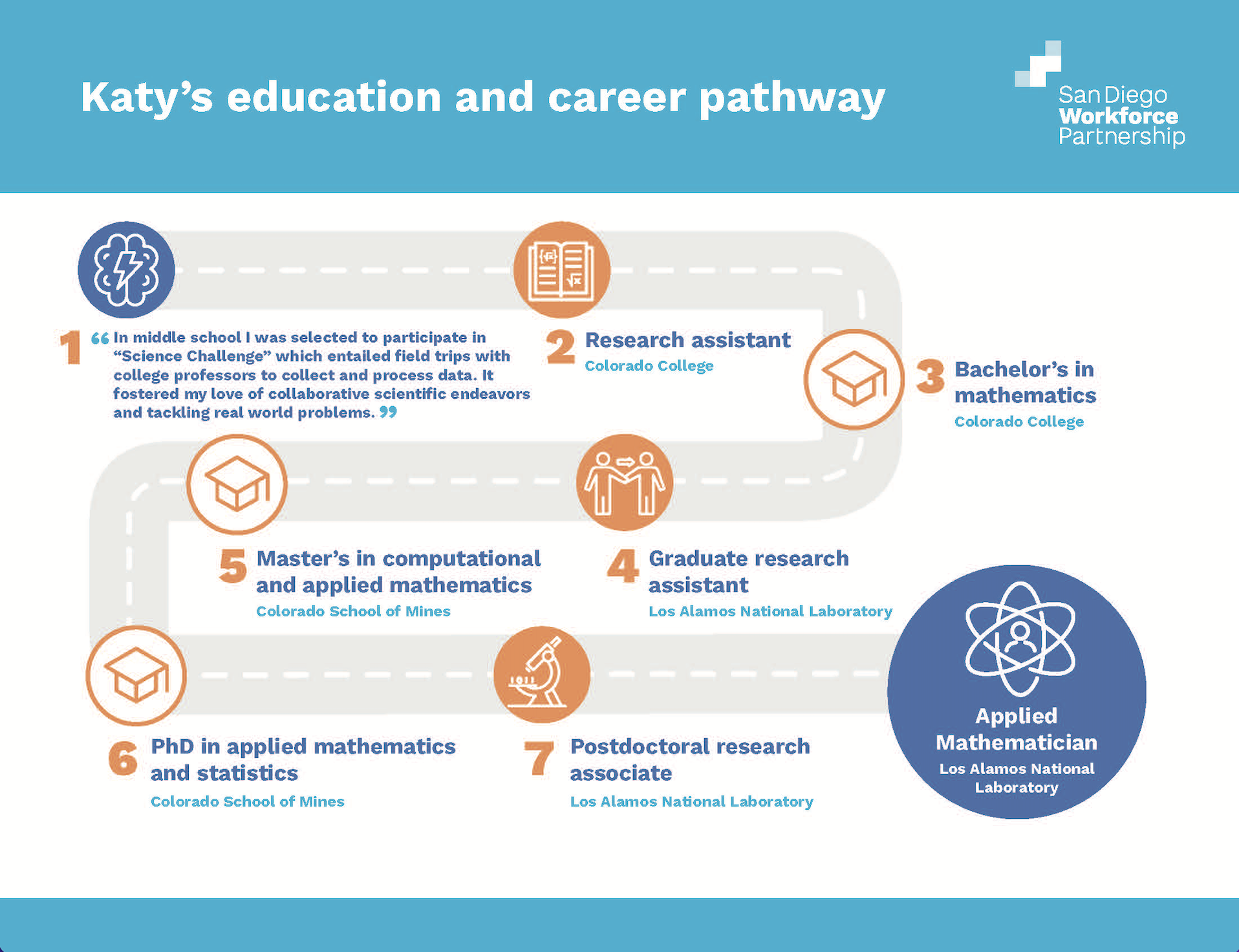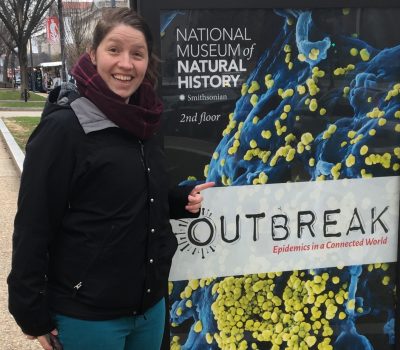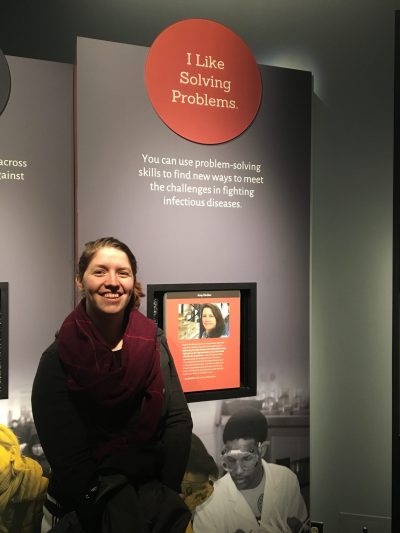Kaitlyn Martinez
How did you get to where you are today? What was your training or education?
Both of my parents are teachers in Colorado so I grew up as a teachers’ kid. My two younger sisters and I grew up in a very curious and learning-oriented household where curiosity, questioning the world, and exploring and scientific discovery were very present from day one. I went through public education and I really enjoyed school because I was raised by teachers. I felt really comfortable with the school setting because I felt it fostered the kind of creative, curious mindset that I grew up with. It took me a while to decide what I wanted to do with that curious mindset. I was lucky in that my high school had a lot of accelerated programs. I enjoyed a lot of different topics: I love science, I love math, I loved history, I love political science. I actually didn’t want to go into math or science at all at first. I was planning on going into the humanities because that was where I could be my most curious and there weren’t clear answers. It was only in college that I realized math has a lot of unanswered questions too. That’s when I really felt called and motivated to pursue math.
I actually wanted to go far, far, far away for college. That was my goal when I was applying for school, but I ended up 12 minutes from home at a small liberal arts school called Colorado College where the focus is very interdisciplinary and on learning the bigger picture of every problem. For me, this approach was nice because I had an opportunity to take a lot of different classes across different fields. I thought I was going in one direction, but I was able to change my direction my junior year and major in math. I did my first research project as a mathematician on bullying behavior. I was really interested in this concept that, typically, bullies have been bullied in the past. To me, that is a lot like an infectious disease process but you’re being infected by a behavior instead of an illness. Working on this project, I really got bitten by the research bug. It taught me a lot about infectious disease modeling and opened the door to mathematical epidemiology, which is using math to answer questions about public health.
From there, I applied to grad school in Denver and dug deeper into research. At the point, my deviation kind of stopped—I had figured out my path. After grad school, I got the opportunity to work at the Los Alamos National Laboratory in New Mexico. My choice to work at the National Lab is really fostered by the fact that I’ve always wanted to do public service. The community mindset that “we’re all in this together” is something that was instilled in me from a very early age. I never really wanted to go work for a major corporation—not because I don’t think it’s a good choice—but because I really wanted to be a part of solving the problems that alleviate people’s day-to-day struggles.

Describe your job. What are some of the important skills you use?
I am what is called an applied mathematician, which means I do math for a living. What I do is use all the tools I’ve learned, from tools I learned in elementary school all the way to more complex tools I learned in graduate school, to solve problems and answer questions that people have. That’s where the “applied” part comes in. Day to day, my problems change a lot so I get to work on a lot of really interesting problems using the same set of tools. Depending on what I’m interested in and what questions are being asked of me, one day I could be talking to a government official and helping them devise a plan to protect people during a pandemic. Another day, I might be modelling diseases. I might model how people get sick, why they get sick and who is most at risk for getting sick or I might look at questions of how the climate and weather impact diseases that are spread by mosquitoes. My skill set is very flexible, which is what I like.
The other thing is I do a lot of is coding. It turns out that, once you get past high school level math, computers do a lot of the work for you. My job is to design what computers do for me.
What do you love most about your job?

I love that I work on interesting and impactful problems that people care about. I’ve been in meetings with the White House, I’ve talked to people that are part of the military and I’ve been at large international conferences where people from all over the world are worried about one single question that we’re all working on together. I can use the wide range of things I’ve learned throughout my schooling and career to help me solve these problems, including things from other subjects like political science or the history of Latin American countries.
The work being interdisciplinary is my second favorite part of the job. I actually do not work with other mathematicians very frequently. More often, I work with computer scientists, biologists, chemists and ecologists. For example, I work with this great group of scientists that are some of the world’s leading experts on birds. I work with people that create big climate models that predict what is going to happen in the climate over the next 100–500 years. I even work with experts in history because it’s important to understand the history of places that we have conflict with to be able to make sound national security decisions.
What is something you find challenging about your job?
As much as novelty and interesting problem solving is the best part of my job, it’s also a really hard part of my job. Oftentimes, when you are at the beginning of studying a subject, there are clear answers that a teacher can give you. But at the level I’m working, no one has answers to the problems I’m solving and that can be really challenging. I’m grateful that I enjoy the perseverance and grit needed to struggle until I get to the bliss of figuring out the next little piece that will take me one step further.
How do you use the skills you learned in elementary school in your work today?
I use the math I learned in elementary school in a lot of different ways. It’s not just the skills I learned, like adding and subtracting, but also what I learned about how to think about and solve problems. Because of what I learned early on, I always approach problems in the simplest manner possible. I break a problem down to its bare bones and if that doesn’t work, then I add complexity to it. I also ask a lot of questions because I was taught to have a questioning mindset.
 What advice do you have for young women?
What advice do you have for young women?
As girls, we are taught subtly from a very early age that we aren’t supposed to be good at math. I want girls to know that learning math isn’t just about getting good grades. Math is really useful for developing a brain that can problem solve and, no matter what job you go into, you’re going to need to know how to solve problems. For example, my grandfather did construction and he was one of the smartest, most analytical problem solvers I’ve ever known. He could just look at a wall and geometrically plan out how he would drywall it in his head. So, learn math, and it will help you in life. For me, I think I’m bad at writing. But I work on my writing because I believe it makes me a better mathematician, just like working on your math will make you better at whatever you end up doing.


